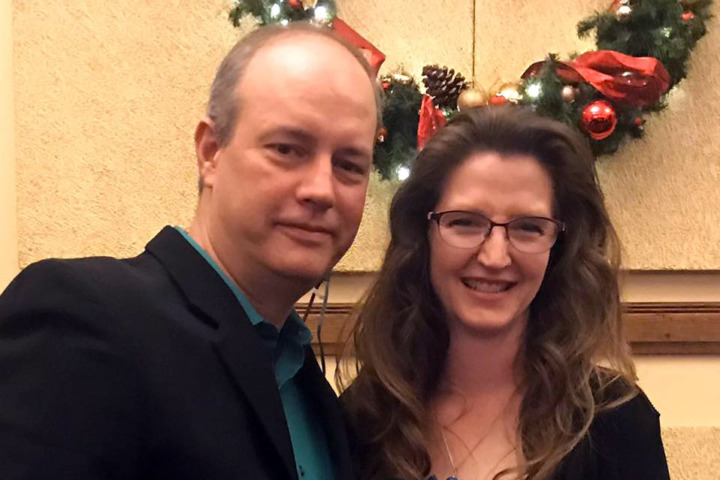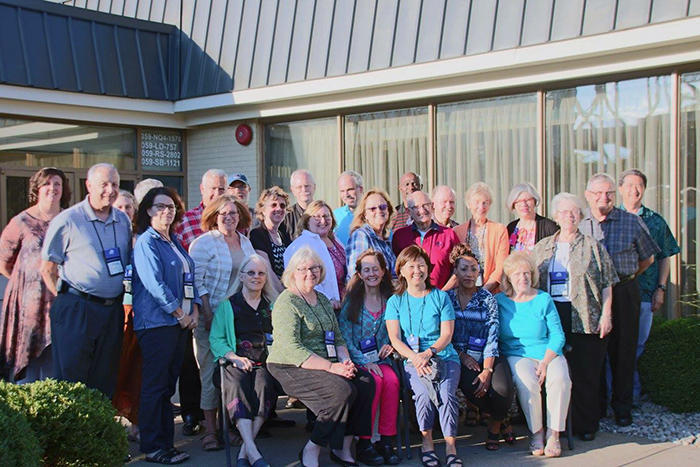開店15分前、グレーティスト・ギフト&スクリプチャー・サプライの店員たちは集まって祈る。店舗前に設置された、顧客が祈りのリクエストを投函できる小箱を開ける。ある時は10枚、ある時は15枚入っているが、今日は空っぽだ。
[toggle]Fifteen minutes before the store opens, the staff of the Greatest Gift and Scripture Supply gathers to pray. They open the small box they keep at the front of the store for customers to leave prayer requests. Some days there are 10. Some days, 15. Today the box is empty. [/toggle]
ヘザー・トロスト(右)と夫のカール(自身のフェイスブックから)
「私たちは、言葉にならないすべての祈りのために祈ります」と、コロラド州プエブロにある同店のオーナー、ヘザー・トロストは言う。店員たちは目を閉じた。ある店員は、「あなたのために祈ってもいいですか」と書いてある服を着ている。しばらく店は静まりかえった。
[toggle] “We’ll just pray for all the unspoken prayers,” says Heather Trost, owner of the Pueblo, Colorado, bookstore. The staff close their eyes. Some of them are wearing buttons that say, May I pray for you? For a moment, the store is quiet. [/toggle]トロストは沈黙のうちに祈る。今日、彼女はさらに聖書を売りたいと思っていた。
[toggle]Trost has an unspoken prayer. Today, she’d like to sell more Bibles. [/toggle]グレーティスト・ギフトにとって厳しい1年だった。キリスト教書店を経営するのは、まるで厳しい年月のビジネスのようだ。業界全体が苦しんでいるのは周知のとおり。
[toggle]It’s been a hard year for the Greatest Gift. Running a Christian bookstore can seem like a business of hard years. It’s no secret the whole industry is struggling. [/toggle]過去20年間に、5200を超える福音派書店が閉店した。厳しいクリスマス・シーズン、景気の低迷、個人の健康問題などによって、いかに簡単にそれが最後の年になるか、トロストはよく知っている。
[toggle]In the last two decades, more than 5,200 evangelical bookstores have gone out of business. Trost knows how easily one hard year—a tough Christmas season, an economic downturn, a personal health issue—can be the last. [/toggle]グレーティスト・ギフトは1949年、第二次世界大戦後の新たな消費の波に乗って創業された。福音派の出版業界は50年代、ビリー・グラハムによってクリスチャンとなった米国人に仕えるため、キリスト教書店協会(CBA)という新たな組織を結成したことで花開いた。
[toggle]The Greatest Gift started in 1949, part of a boom of new commercial activity after World War II. The evangelical book industry flourished in the 1950s, organized by a new group called the Christian Booksellers Association (CBA) to serve the growing number of Americans who identified with the Christianity of Billy Graham. [/toggle]50年代にはおよそ300店あった書店が、65年には約700店、75年には約1850店、85年には3000店を超えた。そして、90年代半ばには全国に7000店を数え、キリスト教小売業は30億ドル産業になった。
[toggle]There were about 300 evangelical retail stores in 1950. That grew to about 700 in 1965, about 1,850 in 1975, then more than 3,000 in 1985. By the mid-1990s, there were more than 7,000 such bookstores across the country, and Christian retail was a $3 billion business. [/toggle]このような成功の最中、しかし暗い日がやって来るという兆(きざ)しはあった。スーパーマーケット・チェーンのウォルマートと会員制スーパーマーケットのサムズ・クラブが『レフトビハインド』や『ヤベツの祈り』(以上、いのちのことば社)、『人生を導く5つの目的』(パーパスドリブン・ジャパン)など、福音派の書籍を扱い始めたのだ。これらは大ベストセラーとなったが、大手販売業者は出版社に大幅な値引きを、福音派書店には安売りを要求した(米国には日本のような書籍の定価販売を守る再販制度がない)。大型書店は取り扱う点数が少ないため、出版社は有名人や実績のある著者を求めるようになり、その結果、無名の作家が市場に参入することが困難となった。
[toggle]In the midst of those successes, though, there were hints of darker days to come. Walmart and Sam’s Club started selling evangelical books like Left Behind, The Prayer of Jabez, and The Purpose Driven Life. Those became mega-bestsellers, but the big ailers also demanded bigger discounts from publishers, in turn undercutting prices at evangelical bookstores. The big stores also sold fewer titles, so publishers increasingly looked for authors with some celebrity or platform, making it harder for unknown writers to break into the market. [/toggle]新たなインターネット時代が始まり、アマゾンは書籍のオンライン販売を95年に開始する。そして、2004年には全米における書籍販売の2割を占めるようになり、地元の書店は危機を感じ始めた。07年には閉店数が開店数を上回るようになり、新しい福音派書店の成長は転換点を迎える。翌年には金融危機(リーマン・ショック)に見舞われ、廃業の波が押し寄せた。
[toggle]Amazon—then a new internet startup—also started to sell books online in 1995. By 2004, it sold about 20 percent of all books in America, and local booksellers started to feel the pinch. The growth of new evangelical bookstores reached a tipping point in 2007 when more stores closed than opened. The next year, the financial crisis hit, and a wave of stores went out of business. [/toggle]CBAによる見本市に出展するところは、99年には1万5000もあったが、2010年には5000まで落ち込んだ。書店は総計2800店まで減少し、さらに減り続けた。福音派最大のチェーン店であるファミリー・クリスチャンは16年に廃業し、240店を閉鎖した。その次に大きいライフウェイ・クリスチャン・ストア(ライフウェイ・クリスチャン・リソースの小売部門)は19年1月にほぼ全部の実店舗の閉店を発表し、その2カ月後、170あった全店舗を閉鎖した。
[toggle]Attendance at the CBA’s annual trade show dropped from 15,000 in 1999 to only 5,000 in 2010. The total number of stores dropped to 2,800, and it kept going down. Family Christian, the largest chain of evangelical stores, closed in 2016, shuttering 240 locations. The next largest chain, LifeWay Christian Stores, the retail arm of LifeWay Christian Resources, announced in January 2019 that it would close most of its brick-and-mortar outlets. Two months later, the decision came to close all 170. [/toggle]
(写真:グレーティスト・ギフト&スクリプチャー・サプライのフェイスブックから)
ビジネスとしてミニストリーを経営すること
[toggle]Running a ministry as a business[/toggle]現在、国内にはグレーティスト・ギフト&スクリプチャー・サプライのような店舗がおよそ1800店残っている。2019年の初め、店が廃業に追い込まれているのではないかと、何人かの客がトロストに何気なく尋ねた。彼らはそう思い込んでいたのだ。
[toggle]Today, about 1,800 stores like the Greatest Gift and Scripture Supply remain in the country. Earlier this year, some customers idly asked Trost when her store was going out of business. They just assumed it was. [/toggle]その後、業界にとってさらに悪いニュースが報じられた。業界団体そのものが閉鎖したのだ。新しい社長は大きな投資計画と資金でCBAを引き継いだが、2019年6月に突如「再生不可能」として、69年間にわたって続けられてきた組織を終了させた。
[toggle]Then there was more bad news for the industry: The trade association itself closed. A new president had taken over the CBA with big plans and money to invest, but in June 2019 he suddenly said it was “beyond fixable” and ended the 69-year-old organization. [/toggle]トロストはCBAの役員だったが、何が起きたのか分からなかった。業界の楽観主義への最後の望みが絶たれ、絶望が本当に襲ってきた。
[toggle]Trost was on the CBA board, and she doesn’t know what happened. With a last-ditch effort at industry optimism gone, the despair really hit. [/toggle]「6、7、8月はどの書店も乗り切るのに厳しい期間だったので、6月に売り上げが落ち込んだ時には、今年は本当にどうなるかと思いました」とトロストは言う。「しかし、私たちはいのちを語ることができます。神が私たちを贖(あがな)われたのです。ですから、悪いことについて話す必要はありません。神が私たちを買い戻されたのですから」
[toggle] “June, July, and August, those are hard months to get through for every retail store, so that was really scary this year when I got depressed in June,” Trost says. “But we have a stance that we speak life. God’s got us. We don’t have to speak about the bad stuff. God’s got us.” [/toggle]福音派出版業の働きはビジネスだ。生き残るには、お金を稼(かせ)がなければならない。そのためには、変化し続ける市場のプレッシャーに対応しなければならない。長年の業界の衰退によって不可能と思われる場合でも、最終的には数字で結果を出す必要がある。
[toggle]The evangelical book industry is a business. To survive, it has to make money. To make money, it has to adapt to changing market pressures. The numbers have to work eventually, even when they seem impossible based on years of industry decline. [/toggle]しかし、福音派出版業の働きはビジネスだけではない。ミニストリーだ。「これらの本を世に送り出すため、神に召されている」と関係者は話す。「神と共にあるならば、すべてのことは可能になる。だから、この働きも可能なのだ」という信仰を彼らは持っている。勝ち目がないと思われるにもかかわらず、マーケットをよそに、数字にとらわれずにだ。
[toggle]But the evangelical book industry is also not a business. It’s a ministry. The people involved say they feel called by God to put these books out into the world. With God all things are possible, so they have faith they can make it work—against the odds, despite the market, and undaunted by the numbers. [/toggle]「ただ単に数字を見るだけではなく、しっかりと神の声を聞くことだと本当に思ったのです」とトロストは言う。「ただ数字を見るために、ここにいるべきではありません」
[toggle] “I really want to make sure I’m hearing God’s voice and not just looking at the numbers,” Trost says. “Looking at the numbers, we shouldn’t even be here.” [/toggle]8月、トロストと夫のカールは、テネシー州マーフリーズボロで開催されたクリスチャン商品エキスポに参加した。CBAに取って代わると主催者が期待した新しい展示会だったが、そこにはおよそ800人の参加者しかいなかった。初日の朝、トロストは専門家から、福音派小売業の未来について「業界の最新情報」を聞いた。
[toggle]In August, Trost and her husband, Carl, attended the Christian Product Expo in Murfreesboro, Tennessee. It’s a new trade show that promoters hope will replace the CBA, but there were only about 800 people there. The first morning, the Trosts heard “industry updates” from a panel of experts on the future of evangelical retail. [/toggle]ホテルの会議室の後方に座ったカール・トロストは、この時点でもう楽観的に考えることはできなかった。
[toggle]Sitting in the back of the hotel conference room, Carl Trost couldn’t think of much that would make him feel optimistic at this point. [/toggle]「『私たちは札束を持っている。それをほしいですか。後方の座席の人たちのために、ここに25万ドルがあります』と彼らが言ったなら、気も晴れたでしょう」と彼は皮肉った。
[toggle] “If they said, ‘We’ve got a bunch of money. Do you want it? Here’s $250,000 for the people in the back row,’ I guess that would make me feel better,” he quipped. [/toggle]そして、真剣にこう付け加えた。「本当にたいへんです。どうしたらいいのでしょう」
[toggle]Then more seriously, he added, “It’s real hard. I don’t know how we’re going to do it.” [/toggle]専門家たちは大筋で同意した。明らかに、時代の変化を否定することはできない。苦心する店舗を救う簡単な解決策はない。
[toggle]The panel of experts mostly agreed. There’s no denying times have changed—and there’s no easy solution to save struggling stores. [/toggle]
(写真:ロゴス・ブックストアーズのフェイスブックから)
「オーナーがただ店舗の看板を出せば人々が入店していたような時代から数年が経ちました」。独立系の福音派小売業協会であるロゴス・ブックストアーズの取締役を務めるベッキー・ゴルチツァは言う。「選択肢はいくつかあります。地元のクリスチャンへの奉仕のためのビジョンと決断をあきらめるか、再調整するか、更新するかです」
[toggle] “It’s been years since a store owner could just put up a sign and have people come in,” said Becky Gorczyca, the executive director of Logos Bookstores, an association of independent evangelical retailers. “You have a couple of choices. You can give up or you can readjust and renew your vision and decide to serve the believers in your community.” [/toggle]ほかの専門家も、同様のアドバイスを与えた。ハーパーコリンズ・クリスチャン出版のトム・ナイトは、環境に注目するよう小売業者に説いた。「あなたの店舗を特別な場所にしてください。人々が助言を求め、時間を過ごしたくなるような場所にするんです。あなたの店舗は避難所になるでしょう」
[toggle]The other experts offered similar advice. Tom Knight, of HarperCollins Christian Publishing, told retailers to focus on the store environment. “Make your store a special place,” he said. “Make your place a place where people want to come for advice, to spend time. Your store is a special refuge.” [/toggle]書籍配給のイングラム・コンテンツ・グループの最高商務責任者を務めるショーン・エヴァーソンは言う。「キリスト教書店は、価格ではアマゾンにかなわないことを受け入れ、イベントや共同体、計画されたコンテンツなど、ほかの何かを提供しなければなりません」
[toggle]Shawn Everson, the chief commercial officer for Ingram Content Group, a book distributor, said Christian bookstores have to accept that Amazon will beat them on price and offer something else: events, community, and curated content. [/toggle]業界のリーダーたちは、キリスト教書店が地元の顧客を常連にし続けられるという構想を持っている。彼らは、個人を対象とした体験を提供するからだ。
[toggle]Industry leaders envision Christian bookstores that are able to keep local customers loyal because they provide a personalized experience. [/toggle]「巨大な小売店は、特定の顧客のことを親身に考えることはしません。たとえば、スーさんのことを考えながら、彼女の体験に特化した企画などはしないのです」。そう語るのは、ホールマークが運営するキリスト教用品店デイスプリングの製品責任者アメリア・ニジンスキだ。
[toggle] “Big box stores, they don’t have people out there thinking of specific customers, thinking of ‘Sue,’ curating an experience specifically for her,” said Amelia Nizynski, product director for DaySpring, a Christian gifts and home decor company owned by Hallmark. [/toggle]こうした独立系キリスト教書店についてのビジョンは、業界が最悪の衰退をし始める前の2008年に専門家が示していたことと変わりはない。
[toggle]This vision for independent Christian stores isn’t that different from what experts were suggesting in 2008, before the worst declines. [/toggle]その会議の場では、誰もそれを大声で言ったわけではない。しかし、そのアドバイスは予感のささやきと共に伝わった。「これはいける」。専門家は福音派小売業者にそう伝えたらしい。しかし、そうではないかもしれない。運が尽きたのかもしれない。(後編に続く)
[toggle]No one at the conference said it out loud, but the advice came with a whiff of foreboding. This could work, the experts seemed to tell the evangelical retailers. But it might not. You might be doomed. [/toggle]